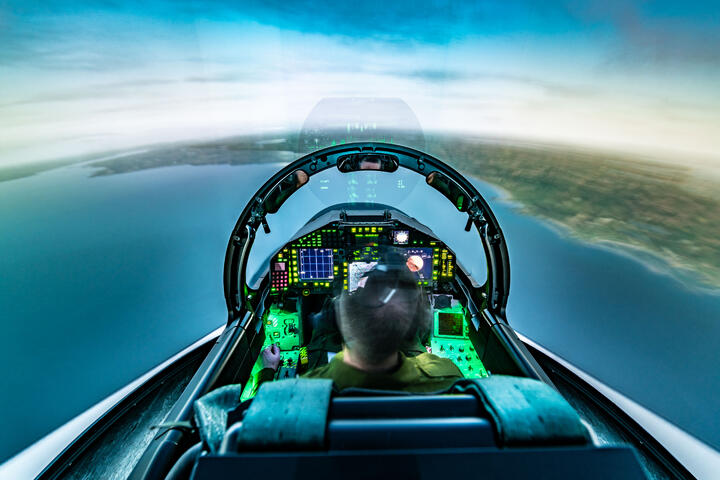AMRC co-pilots Future Air Support with BAE Systems
19 April 2023Aerospace giant BAE Systems has teamed up with the AMRC to drive digital innovations including data visualisation, automation and digital inspection into the maintenance of aircraft to reduce costs, improve efficiency and lower carbon emissions.
Article featured in the latest issue of the AMRC Journal.
Future Air Support was launched by BAE Systems in November 2022 at Royal Air Force (RAF) Coningsby, home to the UK’s Typhoon fleet. The University of Sheffield Advanced Manufacturing Research Centre (AMRC) has joined the project as a research partner to investigate how digital technologies - along with greener, sustainable solutions - can be used to elevate the RAF’s fleet of frontline aircraft.
Nick Sharples, BAE Systems’ head of technology capability delivery – training and support, says the partnership between the AMRC and BAE Systems builds on a long-established relationship that has produced transformational collaborations. Future Air Support vision will see the transformation of fast jet support capabilities now and for future aircraft platforms, such as Tempest.
“We have worked with the AMRC on numerous projects, from small demonstrators to full facilities like Factory 2050 in Sheffield and our Factory of the Future in our BAE Systems site at Warton,” said Nick. “That established trust gives us a strong basis. When we add to that track record, a mutual desire to explore the fast jet support domain, we have a real catalyst for collaborative work together.
“Our initial focus areas with the AMRC are data visualisation, automation and digital inspection; but technology development is at the heart of this, and any number of digital technologies can be established and accelerated.
“Working with our partners to trial new technologies and solutions for future fast jet support helps us explore new ways of delivering leading-edge capabilities and value for money for our customers, whilst reducing environmental impact.”
Ben Morgan, AMRC’s research director, says digital technologies can unlock greater sustainability in the infrastructure of organisations like the Royal Air Force and the cutting-edge innovations being developed alongside BAE Systems will add to the suite of digital technologies available for the Future Air Support project.
He added: “The work we are doing on 5G, the innovations in sustainability we are exploring at AMRC North West, and the past achievements with the collaborative workstation, will all feed into the Future Air Support. We know the mixed reality headsets, the 5G network and the automated inspection systems can work; it’s now about integrating it and applying it in a real-world environment.”
The innovations from the project will significantly reduce costs and improve the availability of front line Typhoon fighter jets and, in the future, Tempest. These technologies could be used to reduce fatigue and chance of injuries among support crews as well as improve the speed of maintenance on aircraft. Some of the programmes being trialled include: exoskeletons, autonomous co-bots, augmented reality headsets and sustainable operations.
Nick said: “We are extending the digital thread so that there is an end-to-end digital default approach, from manufacture on the factory floor to support in the operational environment. Digital technologies can create new ways of delivering leading-edge capabilities and value for money, whilst reducing our environmental impact.”
Ben explained that incorporating digital technologies ‘creates agility, fidelity and efficiency’. He said: “You could have an automated guided vehicle (AGV) pull a jet into the hangar while a drone might inspect for battle damage or bird strikes. Then within the building there could be vision systems and photogrammetry, another AGV might inspect the undercarriage with a robotic arm and an engineer wearing an augmented reality (AR) headset would be guided through an operation.
“Incorporating those digital technologies creates agility, fidelity and efficiency; the more you can digitise the maintenance, repair and overhaul (MRO) and automate the inspection processes, the better. Crucially though, the data you acquire through digitalisation will lead to greater through-life engineering, lower costs and better sustainability. If we understand the data, we understand the waste, and we can get systems working better and greener.”
The AMRC has also worked with BAE Systems to support mixed reality and geotagging technologies to build a powerful maintenance, repair and overhaul (MRO) digital twin. The Future Air Support project is the next step in that work. The partnership builds on a long-established relationship between the AMRC and BAE Systems that has produced transformational collaborations such as the robotic countersinking project, which enabled an automated production system to accurately machine holes in composite aircraft components; the development of a collaborative robot workstation fitted with a range of digital technologies, which has been introduced to BAE Systems’ Warton site in Lancashire; and the evolution of the Factory of the Future facility, an intelligent, smart factory set to increase productivity and revolutionise combat aircraft production.

